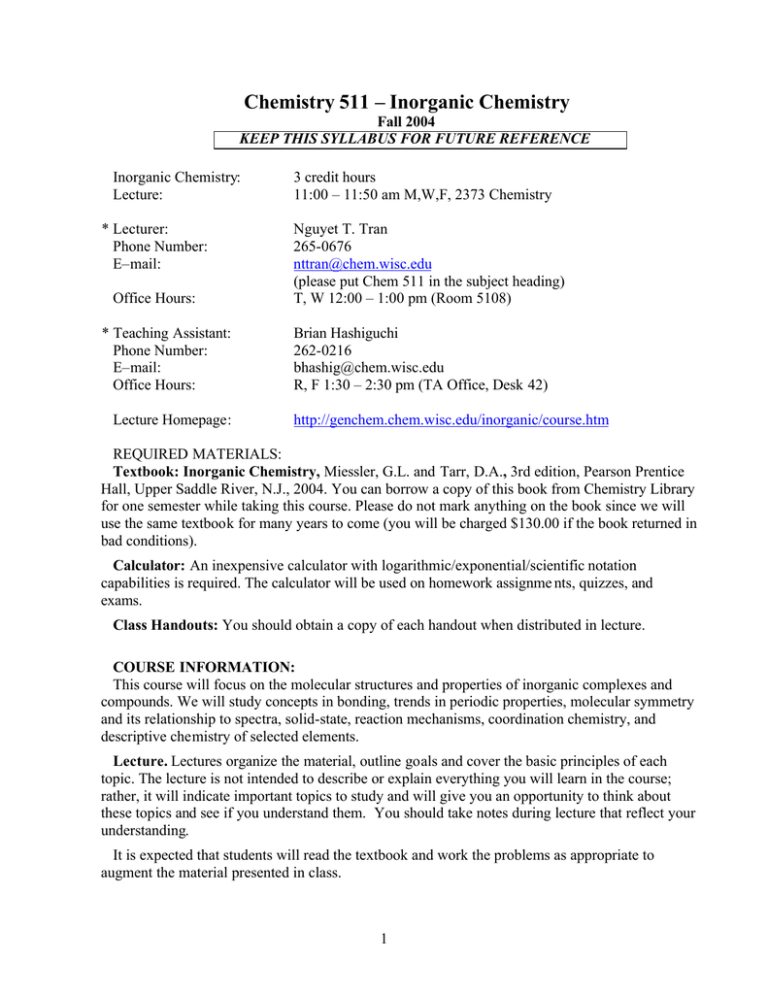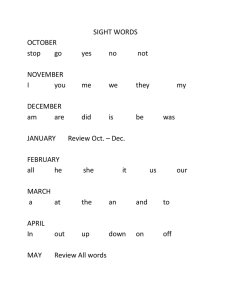
Chemistry 511 – Inorganic Chemistry
Fall 2004
KEEP THIS SYLLABUS FOR FUTURE REFERENCE
Inorganic Chemistry:
Lecture:
* Lecturer:
Phone Number:
E–mail:
Office Hours:
* Teaching Assistant:
Phone Number:
E–mail:
Office Hours:
Lecture Homepage:
3 credit hours
11:00 – 11:50 am M,W,F, 2373 Chemistry
Nguyet T. Tran
265-0676
nttran@chem.wisc.edu
(please put Chem 511 in the subject heading)
T, W 12:00 – 1:00 pm (Room 5108)
Brian Hashiguchi
262-0216
bhashig@chem.wisc.edu
R, F 1:30 – 2:30 pm (TA Office, Desk 42)
http://genchem.chem.wisc.edu/inorganic/course.htm
REQUIRED MATERIALS:
Textbook: Inorganic Chemistry, Miessler, G.L. and Tarr, D.A., 3rd edition, Pearson Prentice
Hall, Upper Saddle River, N.J., 2004. You can borrow a copy of this book from Chemistry Library
for one semester while taking this course. Please do not mark anything on the book since we will
use the same textbook for many years to come (you will be charged $130.00 if the book returned in
bad conditions).
Calculator: An inexpensive calculator with logarithmic/exponential/scientific notation
capabilities is required. The calculator will be used on homework assignme nts, quizzes, and
exams.
Class Handouts: You should obtain a copy of each handout when distributed in lecture.
COURSE INFORMATION:
This course will focus on the molecular structures and properties of inorganic complexes and
compounds. We will study concepts in bonding, trends in periodic properties, molecular symmetry
and its relationship to spectra, solid-state, reaction mechanisms, coordination chemistry, and
descriptive chemistry of selected elements.
Lecture. Lectures organize the material, outline goals and cover the basic principles of each
topic. The lecture is not intended to describe or explain everything you will learn in the course;
rather, it will indicate important topics to study and will give you an opportunity to think about
these topics and see if you understand them. You should take notes during lecture that reflect your
understanding.
It is expected that students will read the textbook and work the problems as appropriate to
augment the material presented in class.
1
• Fifteen-minute quizzes and problem sets will be given on alternate Mondays (see Schedule).
The quizzes will take no more than 15 minutes and are designed to quickly assess your skill in
applying the tools taught in class. Problem sets will be given out on Monday and due the
following Monday. No make-up quizzes will be given, the lowest quiz score will be dropped in
calculating the final grade.
Exams. There will be a 75 minute midterm exam and a two-hour final exam scheduled as in this
syllabus. If you have any conflict, please let me know as early as you can. The final exam will
focus on material covered in the second segment of the course but you may have to use concepts
from past material but no direct questions. The location of each exam will be announced later. The
exam schedule is:
Midterm exam
Monday, Oct. 25
5:30 – 7:00 pm
Final exam
Monday, Dec. 20
2:45 – 5:00 pm
Research paper. You will work in group of four students to study a research topic of your
choice, write up a report, and present it in class. Each group will have 15 minutes to present its
study to class. The presentation can be done with Microsoft Power Point format. (You will have
one session on Oct. 1 to learn “Library Skills in Chemistry” from Emily Wixson, Educational
Resource Librarian). A copy of the articles, and your research paper are due in class on Nov. 24.
Presentations and discussions will take place from Dec. 8. It is important that everyone participate
in these discussions. More detail concerning this project will be given to you as the semester
proceeds.
RESOURCES
Electronic Mail (e-mail). Contact me via e-mail if you have questions or comments about the
course or the work you are doing. I will respond to all messages, either directly via e-mail or,
when appropriate, in the next lecture. E-mail is available at all times of day and night, so you can
send messages whenever something comes to mind.
My email address is: nttran@chem.wisc.edu, please put Chem 511 in the subject heading.
Web Site. Resource material for this lecture is available on the web. The homepage for my
lecture includes: information about the course; the course syllabus; copies of handouts; copies
of old quizzes, problem sets and exams; and answer keys for quizzes, problem sets and exams
of this class. The address to access this material is on page 1.
Study Groups. You may collaborate with other students on homework assignments. Study
groups reflect the teamwork inherent in the way modern science is done. It is important to realize
that although you may collaborate with other students on assignments, the work you turn in must
be your own. Thus, you must turn in an individual write-up (not a copy of the study group's
work) of homework.
Students with Disabilities
Students with disabilities should contact Dr. Tran as soon as possible at the beginning of the semester
to arrange accommodations. This applies to lecture and special accommodations for exams.
2
GRADES
Best 5 of 6 quizzes
Problem sets
Research paper*
75-minute exam
Final exam
5 x 20
5 x 20
100 points
100 points
30 points
100 points
170 points
_________
Maximum score
500 points
* Research paper will be graded in "low-resolution" fashion: a "30" for an excellent study; a "20"
for a good study; a "10" for a fair study; and "0 " for no effort.
Letter grades will be assigned at the end of the semester based on the following scale:
A
450–500 points (90%)
AB
435–449 points (87%)
B
400–433 points (80%)
BC
385–400 points (77%)
C
325–384 points (65%)
D
250–324 points (50%)
Final grades will be based upon an absolute scale. Thus, if you earn a total of 450 points, you are
guaranteed an A, no matter how many other students earn that number of points. You are
competing against this scale, not against other students, and it is to your benefit to help each other.
Review Your Grades. Your grades will be entered electronically in the WebCT and available to
you so you can check our records for accuracy. To maintain confidentially, you will be required to
enter your ID number.
3
Tentative Course Outline
Date
Topic
Textbook Reference
F, Sep 3
Introduction and Review
Chapter 1
M, Sep 6
LABOR DAY
W, Sep 8
Atomic Structure and Properties
Chapter 2
F, Sep 10
Atomic Structure and Properties
Chapter 2
M, Sep 13
Bonding Theory
Chapter 3
W, Sep 15
Bonding Theory
Chapter 3
F, Sep 17
Symmetry and Group Theory
Chapter 4
M, Sep 20
Symmetry and Group Theory
Chapter 4
W, Sep 22
Symmetry and Group Theory
Chapter 4
F, Sep 24
Symmetry and Group Theory
Chapter 4
M, Sep 27
Symmetry and Group Theory
Chapter 4
W, Sep 29
Symmetry and Group Theory
Chapter 4
F, Oct 1
Library Skills in Chemistry
M, Oct 4
Molecular Orbital Theory
Chapter 5
W, Oct 6
Molecular Orbital Theory
Chapter 5
F, Oct 8
Molecular Orbital Theory
Chapter 5
M, Oct 11
Molecular Orbital Theory
Chapter 5
W, Oct 13
Molecular Orbital Theory
Chapter 5
F, Oct 15
Acid/Base Chemistry
Chapter 6
M, Oct 18
Acid/Base Chemistry
Chapter 6
W, Oct 20
Acid/Base Chemistry
Chapter 6
F, Oct 22
Solid State: Structure and Bonding
Chapter 7
4
Quiz 1
PS 1 (due)
Quiz 2
PS 2 (due)
Quiz 3
PS 3 (due)
M, Oct 25
MIDTERM EXAM 5:30 – 7:00 pm
W, Oct 27
Solid State: Structure and Bonding
Chapter 7
F, Oct 29
Solid State: Structure and Bonding
Chapter 7
M, Nov 1
Descriptive Chemistry
Chapter 8
W, Nov 3
Descriptive Chemistry
Chapter 8
F, Nov 5
Descriptive Chemistry
Chapter 8
M, Nov 8
Coordination Chemistry II
Chapter 9
W, Nov 10
Coordination Chemistry I
Chapter 9
F, Nov 12
Coordination Chemistry I
Chapter 9
M, Nov 15
Coordination Chemistry I
Chapter 9
W, Nov 17
Coordination Chemistry II
Chapter 10
F, Nov 19
Coordination Chemistry II
Chapter 10
M, Nov 22
Coordination Chemistry III
Chapter 11
PS 5 (due)
W, Nov 24
Coordination Chemistry III
Chapter 11
Reseach Paper
F, Nov 26
Thanksgiving Break
M, Nov 29
Organometallic Chemistry
Chapter 13
W, Dec 1
Organometallic Chemistry
Chapter 13
F, Dec 3
Organometallic Reactions
Chapter 14
M, Dec 6
Bioinorganic Chemistry
Chapter 16
W, Dec 8
Class Presentations
F, Dec 10
Class Presentations
M, Dec 13
Class Presentations
W, Dec 15
Class Presentations
M, Dec 20
FINAL EXAM 2:45 – 5:00 pm
5
Quiz 4
PS 4 (due)
Quiz 5
Quiz 6



